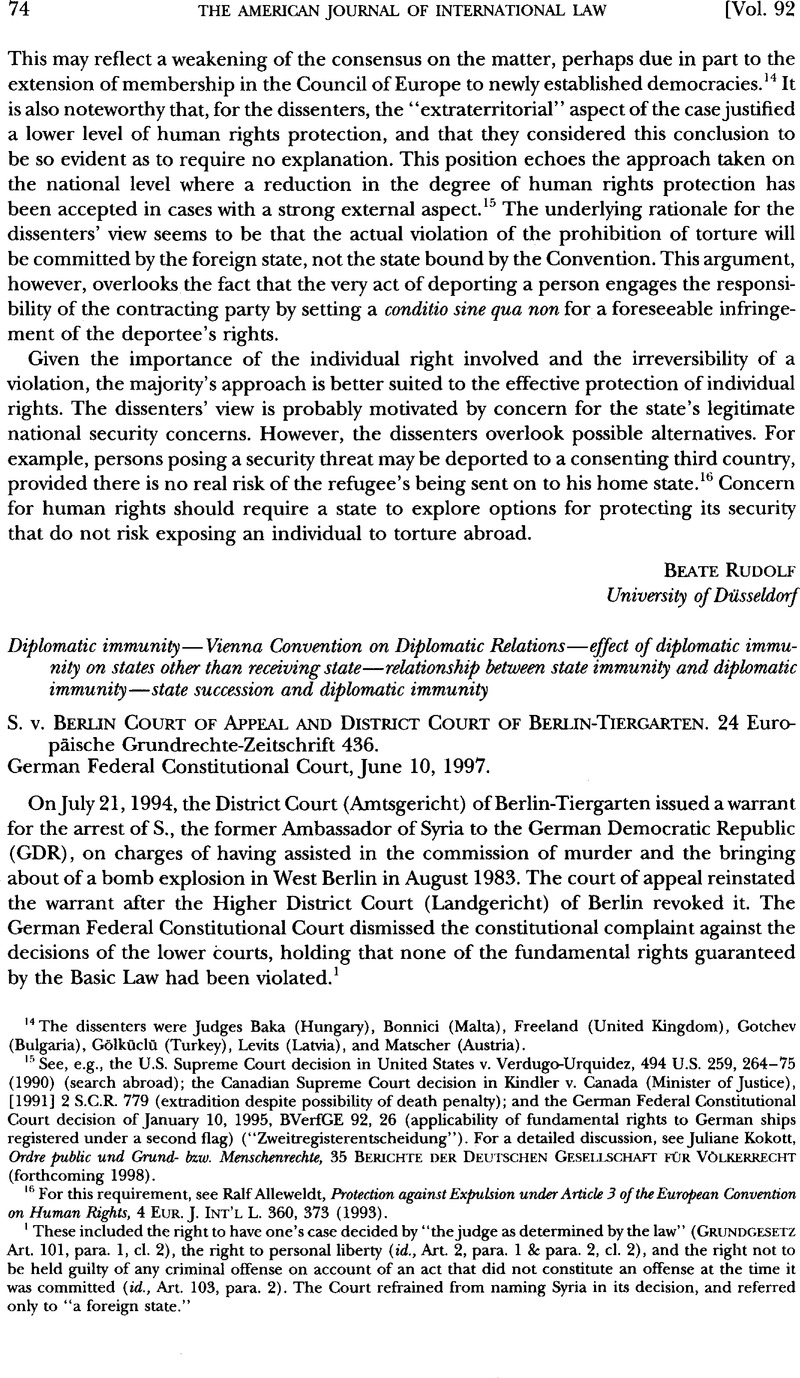No CrossRef data available.
Article contents
S. v. Berlin Court of Appeal and District Court of Berlin-Tiergarten
Published online by Cambridge University Press: 27 February 2017
Abstract

- Type
- International Decisions
- Information
- Copyright
- Copyright © American Society of International Law 1998
References
1 These included the right to have one’s case decided by “the judge as determined by the law” (Grundgesetz Art. 101, para. 1, cl. 2), the right to personal liberty (id., Art. 2, para. 1 & para. 2, cl. 2), and the right not to be held guilty of any criminal offense on account of an act that did not constitute an offense at the time it was committed (id., Art. 103, para. 2). The Court refrained from naming Syria in its decision, and referred only to “a foreign state.”
2 This report will not cover aspects of the decision relating only to German constitutional law.
3 Apr. 18, 1961, 23 UST 3227, 500 UNTS 95 [hereinafter Convention].
4 According to West German law, West Berlin was a Land of the Federal Republic. This claim, however, was not supported by any of the four principal Allied powers. For the legal status of the Western sectors of Berlin between 1945 and 1990, see I. D. Hendry & M. C. Wood, The Legal Status of Berlin (1987).
5 24 Europäische Grundrechte-Zeitschrift 436, sec. B II, para. 2(b)(dd) [hereinafter Decision].
6 Id., para. 3(a) (bb).
7 Id., para. 3(b).
8 Id., para. 3(b)(cc).
9 Stanislaw, E. Nahlik, Development of Diplomatic Law: Selected Problems , 222 Recueil des Cours 187, 238–39 (1990 III)Google Scholar (footnote omitted). See also Draft articles on diplomatic intercourse and immunities, Art. 39 Commentary, para. 3, [1958] 2 Y.B. Int’l L. Comm’n 103, UN Doc. A/CN.4/SER.A/1958/Add.1. Article 19 of the first codification of the law of diplomatic relations, the Pan-American Convention on Diplomatic Officers, Feb. 20, 1928, stated that “[diplomatic officers are exempt from all civil or criminal jurisdiction of the state to which they are accredited; they may not, except in the case when duly authorized by their government they waive immunity, be prosecuted or tried unless it be by the courts of their own country.” 22 AJIL Supp. (No. 3) at 142, 145 (1928) (emphasis added). This formulation suggests that a diplomat was not to be subjected to the jurisdiction of any state but his own.
10 See 1 Oppenheim’s International Law 1123 (Robert, Jennings & Arthur, Watts eds., 9th ed. 1992)Google Scholar.
11 See Decision, sec. A IV.
12 Seen in this light, Article 40 of the Convention can be regarded as clarifying the legal position of diplomats in a situation they regularly encounter, namely, having to pass through the territory of a third state when traveling between their post and their home country. Article 40 need not necessarily be interpreted as defining the only cases in which a third state must respect a diplomat’s immunity or, in particular, as excluding immunity from the criminal jurisdiction of a third state with regard to acts performed in the receiving state.
13 For the criminal jurisdiction of states according to these principles, see, e.g., Ian, Brownlie, Principles of Public International Law 300–05 (4th ed. 1990)Google Scholar. See also Restatement (Third) of the Foreign Relations Law of the United States §§421–23 (1987).
14 See Alfred, Verdross & Bruno, Simma, Universelles Völkerrecht 580 n.68 (3d ed. 1984)Google Scholar.
15 See Nahlik, supra note 9, at 251; see also Philippe, Cahier, Le Statut diplomatique , in Aspects Récents du droit des relations diplomatiques: Colloque de Tours 205, 222–23 (Société Française pour le Droit International ed., 1989)Google Scholar (saying that the diplomatic mission is considered a state organ to which the rules of state immunity apply).
16 See Convention, supra note 3, Preamble, para. 4.
17 See Nahlik, supra note 9, at 221–22. At the time the International Law Commission drafted the Vienna Convention, the then leading German treatise explained that the immunity of a diplomat with regard to official acts is in fact the immunity of his state, and is therefore also to be respected by third states. See 1 Georg Dahm, Völkerrecht 325, 343–46 (1958). See also 1 Lassa, Oppenheim, International Law 788 n.1, 792–93 (Hersch, Lauterpacht ed., 8th ed. 1955)Google Scholar (“the exterritoriality which must be granted to diplomatic envoys by the Municipal Laws of all the members of the international community”) (emphasis added); and 1 Jost, Delbrock & Rudiger, Wolfrum, Völkerrecht, pl. 1, at 277, 284–87 (the 2d ed. of Dahm’s work, 1989)Google Scholar. The first part of the proposition is also supported by Alfred, Verdross, Volkerrecht 332–33 (5th ed. 1964)Google Scholar. The same view was taken by Professors Karl Doehring and Georg Ress in an expert opinion presented to the Court. See Decision, sees. A II, para. 1, and A III.
18 See Decision, sec. B II, para. 3(a) (ee).
19 See United States Diplomatic and Consular Staff in Tehran (U.S. v. Iran), 1980 ICJ Rep. 3, 39–42, paras. 83–87 (May 24). See also Bruno, Simma, Self-contained Regimes , 16 Neth. Y.B. Int’l L. 111, 135 (1985)Google Scholar (“ ‘selfcontained regimes’ are exceptions to the rule of the applicability of general legal consequences of internationally wrongful acts”).
20 See also the case of two Iraqi diplomats accredited to the Government of the GDR in East Berlin who, on August 1, 1980, were arrested by the West Berlin police for having delivered explosives to a person who had been incited to commit a bomb attack on a meeting of Kurdish students in West Berlin. The three Western Allied powers held that the case was to be decided by the Senate (Government) of West Berlin. The Senate, on the advice of the Federal Government in Bonn, expelled the two diplomats. See Charles, Rousseau, Chronique des faits intemationaux , 85 Revue Générale de Droit International Public 99, 106–07 (1981)Google Scholar.


